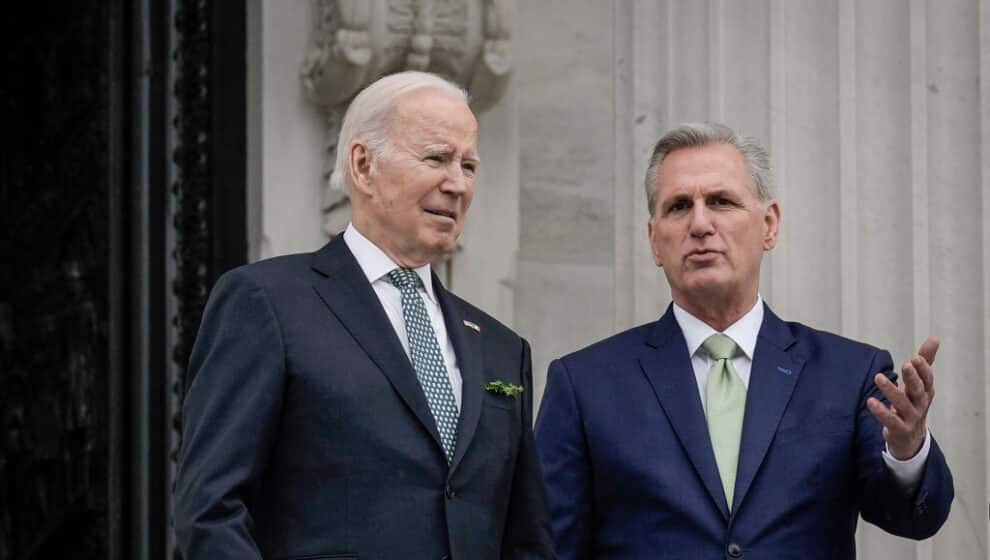Since reaching the debt ceiling in January, U.S. lawmakers have made little progress toward a solution—and House Speaker Kevin McCarthy (R-CA) demands that change.
Key Details
- This week McCarthy sent a letter to President Joe Biden, requesting that the White House and House Republicans begin negotiating a solution to the U.S. debt limit.
- McCarthy’s letter suggested spending cuts and regulatory changes to start negotiations.
- President Biden and McCarthy have not met to discuss the debt ceiling since February 1, Bloomberg reports.
- “With each passing day, I am incredibly concerned that you are putting an already fragile economy in jeopardy by insisting upon your extreme position of refusing to negotiate any meaningful changes to out-of-control spending alongside an increase of the debt limit,” McCarthy says in the letter.
- The White House quickly responded to McCarthy’s letter, saying that the House Republicans must raise the debt ceiling without imposing any conditions. It also asked that the GOP provide a full budget proposal.
Why it’s news
After warnings from Treasury Secretary Janet Yellen that the U.S. would reach its debt limit, House Republicans refused to increase the debt ceiling without certain spending cuts. In response, the White House said it would not negotiate.
To avoid a default, Yellen implemented what the treasury calls “extraordinary measures,” accounting maneuvers to keep the government running until an agreement is reached. Though these efforts have avoided a government shutdown for now, lawmakers must reach an agreement by the summer to avoid defaulting on the nation’s debt.
The White House’s response to McCarthy’s letter indicates that negotiations are still unlikely. Following the Biden administration’s request for a total budget proposal, McCarthy told CNBC that the request did not make sense as the budget has “nothing to do” with the debt limit.
In the McCarthy letter, Republicans suggested several areas where spending could be reduced, including reducing domestic appropriations, reclaiming unused COVID-19 funds, relaxing regulations on energy projects, and including more work requirements to receive government benefits.
House Republicans had initially planned to release a 10-year budget around April, but that plan has now been delayed.
Notable quotes
“It’s time for Republicans to stop playing games, agree to pass a clean debt ceiling bill, and quit threatening to wreak havoc on our economy. And if they want to have a conversation about our nation’s economic and fiscal future, it’s time for them to put out a budget—as the president has done with his detailed plan to grow the economy, lower costs, and reduce the deficit by nearly $3 trillion,” says White House spokesman Karine Jean-Pierre.
Backing up a bit
The U.S. has hit its debt limit earlier than expected, and federal lawmakers are feuding about whether or not to raise the limit. U.S. Treasury Secretary Janet Yellen will invoke what the Treasury calls extraordinary measures to allow the U.S. government to continue operations.
These methods will extend the deadline to raise the ceiling until June.
Secretary Yellen’s plans are to redeem investments from various retirements—including the Civil Service Retirement and Disability Fund and the Postal Service Retiree Health Benefits Fund—and temporarily stop making new investments in these funds.
The Treasury Department will also pause investment in the Federal Employees Retirement System Thrift Savings Plan and the Government Securities Investment.
Congress must now decide whether or not to raise the debt ceiling, but the two parties are strongly divided. The debt ceiling was last raised in 2021 to around $31.4 trillion.
If no agreement is reached, it could trigger a government shutdown. The last government shutdown was in 2019. During a shutdown, non-essential government employees are furloughed while essential workers work without pay. When the shutdown is resolved, workers will receive back pay. Some government services may also be temporarily suspended during a shutdown.
